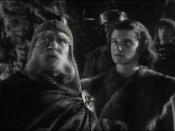People are indecisive when forced into making difficult decisions. The pros and cons weigh heavily in the formation of a person's final choice. Macbeth is faced with a decision that will make a huge impact on his kinsmen, subjects, and the people of Scotland. In his soliloquy in Act I, scene vii, lines 1-28, Shakespeare uses figurative language, diction, and structure to reveal Macbeth's ambivalence toward the killing of Duncan.
Shakespeare conveys Macbeth's ambivalence through the use of figurative language. When people teach the act of murder, it returns to "plague th' inventor."ÃÂ (10) Like Duncan, Macbeth will become the victim of the murder as well. Although Macbeth will be king, he is fearful to know that he will be haunted for the rest of his life.
If Macbeth succeeds in murdering Duncan, Duncan's virtues will "plead like angels"ÃÂ (19) because his service as king is so profound.
Duncan's sudden death will be mourned since he did not do anything to deserve his assassination. Even though Macbeth is Duncan's kinsman and subject, Duncan's position as king will not fulfill Macbeth's place. Angels will be loudly proclaiming Duncan's "deep damnation"ÃÂ of "his taking off."ÃÂ (20) Their proclamation is an expression of their anger toward his death. To them, Duncan's unexpected departure is unthinkable. Shakespeare relates Duncan's death to the "pity,"ÃÂ of a "naked newborn babe."ÃÂ (21) People view a newborn as an innocent creature.
Duncan is like a newborn because he has always been respectful to his kinsmen and subjects. He never brings harm to Macbeth, therefore, Macbeth appears evil. After Duncan's death, there will be such grief that the "tears will drown the wind."ÃÂ (25) All of the people of Scotland will be crying. The degree of sadness will be so enormous, the tears shed will...


